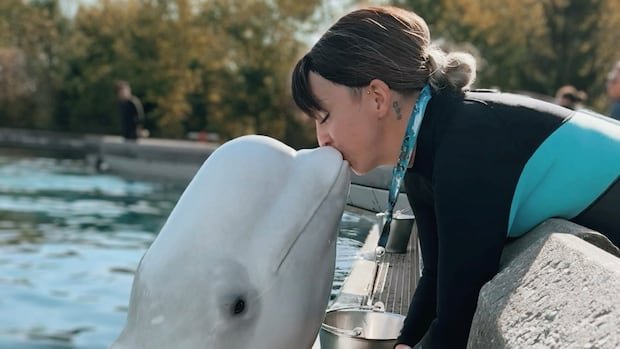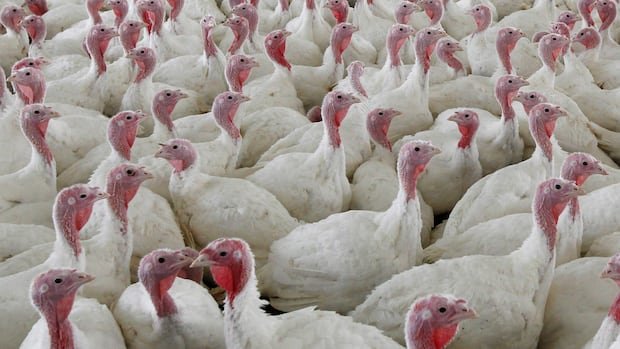Marineland’s deteriorating infrastructure, staff shortages and lack of resources have created dangerous conditions for its belugas and they must be moved immediately, says a fired beluga trainer.
Kristy Burgess, who worked at the park in Niagara Falls, Ont., when a young beluga was euthanized in February, said Marineland’s threat to euthanize the remaining 30 belugas if it doesn’t receive emergency funding is a “repulsive” tactic that uses the whales as leverage.
“We need to get them out,” Burgess said of the last captive whales in Canada. “Immediately.”
Burgess speaks for the first time about his experience at Marineland, where the same whales he loved now face possible death.
Nineteen belugas, one dolphin and one orca have died in the park since 2019, according to a database created by The Canadian Press from internal documents and official statements.
The beluga pools, Arctic Cove and Friendship Cove, are in desperate need of repair with their painted walls peeling and chunks of concrete falling into the water, Burgess said.
“The whales have arrived with paint chips on their tongues,” he said. “The pools are falling apart.”
Rocks from pool décor have crumbled into the tanks, which provides some excitement for the whales as they like to play with them or try to eat them, he added.
“We’ve had people have to go into the water and fish out really big, heavy rocks, probably the size of dinner plates,” Burgess said.
The water system has regularly broken down, Burgess said, affecting the park’s ability to lower and raise water, which is crucial for providing medical treatment to the whales. This has meant delays in treating the whales or trainers taking additional risks to go into deeper waters to provide care, he said.
Marineland did not respond to requests for comment.
Marineland did not respond to multiple requests for comment with detailed questions about Burgess’ allegations.
The park, once a tourist attraction, is now in crisis after the federal government denied it export permits to move its 30 belugas to Chimelong Ocean Kingdom, a huge aquarium in China. The park said it is nearly bankrupt and has no other viable options to relocate the whales.
Fisheries Minister Joanne Thompson said she rejected the export request because she did not want to subject the belugas to future performance in captivity, which is consistent with a federal law passed in 2019.
Marineland then wrote to the minister asking for emergency funding to feed and care for the whales, saying it was running out of money and would otherwise have to cull them.
Burgess said he wants Thompson to reconsider his decision. He considers that the minister is far from the reality of the situation.
“The minister and everyone keep saying, ‘Well, they might not make it if they move to China,’ or that they’re going to perform or breed, but the reality is I’d rather see them try and (if) they don’t make it and they pass, that’s fine, but at least they tried,” he said.
“How is it a better plan to leave them at Marineland? Either they will slowly die there or they will be euthanized because someone wants to make money off the land they are sitting on.”
Thompson’s office said the minister made clear that the decision to deny export permits was made in accordance with the law and “with the best interests of the belugas in mind.”
Thompson has urged Marineland to come up with a new plan and said he will consider any proposals quickly.
Marineland founder John Holer died in 2018 and his wife, Marie, ran the park until her death in 2024. The property has been placed in a trust.
The animals have been an impediment to the park’s sale, although the sprawling property is worth hundreds of millions of dollars, perhaps more.
Marineland has become a hot political topic, with the federal and provincial governments accusing each other of helping the belugas. Premier Doug Ford said Ottawa created this disaster, while Thompson said the health and well-being of whales is a provincial responsibility.
Province is responsible for enforcing animal welfare laws
Ontario is responsible for enforcing animal welfare laws and has conducted an extensive ongoing investigation into Marineland since 2020. Inspectors visited the park more than 220 times and issued 33 compliance orders.
The park’s water has been a problem for a long time.
The province has four long-standing outstanding warrants against Marineland. They focus on water quality, maintenance and repair of the water system, proper maintenance of whale and dolphin records, and the condition of enclosures and the level of enrichment for dolphins, seals and sea lions, the Ministry of the Attorney General said.
In 2021, the province declared all Marineland marine mammals endangered, citing water shortages. Marineland disagreed, appealed against an order, but later dismissed its appeal.
Marineland has been silent in recent days as last week’s deadline for its funding application passed. The province confirmed Thursday that the whales were still alive, but did not provide further details.
Until recently, Burgess was a lifelong Marineland fan. He remembers falling in love with the park when he visited when he was seven years old. When he was 15, he worked at Hungry Bear, the park’s main restaurant, for two summers.
She applied for other jobs at Marineland and finally landed one in 2022. She started as a whale keeper, which involved preparing meals based on frozen fish. Herring, capelin and smelt form the core of the beluga diet.
Burgess was soon promoted to assistant marine mammal keeper. She then became a beluga trainer.
The workload weighed on Burgess over time. He said the park was short-staffed when he worked there and had 18 workers manning both beluga pools. The whales need daily care, so breaks, different shifts, free time and illnesses meant that between five and seven people could be dedicated to caring for the animals, he said.
“It’s not even enough,” he said.
During his three years at Marineland, seven belugas and the park’s only killer whale, Kiska, died.
Burgess said the deaths affected Marineland’s trainers and handlers, who work year-round in all weather conditions for long, laborious hours.
“They’re tired, they’re carrying the weight of all the pain they’ve seen over the years and they’re spread thin, but they still show up and do the best they can,” he said. “And they pay them pennies.”
Burgess said she was paid $18.50 an hour as a full-time trainer, compared to the $17.50 she earned as a caregiver. Some of the most experienced trainers make a little more than $20 an hour, he said.
He wants the public to know more about the belugas left at Marineland.
Xena is the matriarch and Xavier is the nerd of the group.
There’s Xena, the matriarch of the group.
“Her age doesn’t hold her back,” Burgess wrote in a Facebook post with a blurb about each whale. Xena is the mother of two children born in the park: Eve, a more reserved beluga who “giggles” when she vocalizes, and Xavier, the “nerd” of the group who is “extremely intelligent and loves to play with enrichment,” Burgess wrote.
Some belugas are more dominant and others more submissive, he explained.
“They are very affectionate, they are affectionate and they form very close social bonds with each other,” he said.
Part of the 2019 law that banned captivity has had a detrimental effect on whales, he said. Ottawa banned breeding, so Marineland had to separate the males and females, as there is no birth control for belugas otherwise.
This has caused problems when beluga families are separated.
“The males, when they become hormonal, become very aggressive toward each other,” Burgess said, citing as an example the whales’ “raking”: scraping their teeth with other belugas causing permanent scarring.
“There has been raiding to an extreme degree,” he said.
“Females are very skittish and nervous, whereas before, when males were present, they were much more confident.”
Marineland’s threat to cull all of its whales hit the park like a bomb, Burgess said, since he is still close to many workers there.
But he said it is not a credible threat.
“It’s repulsive, but the vets won’t do it, the keepers won’t do it,” he said.
Mass euthanasia is ‘insanity’, says former coach
Mass euthanasia is “insane,” he said, and even if there were workers willing to perform it, it would take days. Euthanasia is difficult for workers, he said, even when it is necessary, like in February.
Eos, a seven-year-old juvenile beluga, was struggling at the time. The whale had been sick since birth and euthanizing it was the right decision, Burgess said.
Burgess had formed a deep connection with Eos, having become one of his caretakers over the previous year. Eos was having trouble eating, so Burgess spent hours trying different ways to get food to the whale.
Despite the workers’ efforts, life began to escape Eos.
“I wanted to be able to see his body, so I had closure because the previous whales, when they passed by, I would go in to work and they would just be gone and you would have to carry on,” Burgess said through tears.
She didn’t want that with Eos, so she pushed to be part of the process. “I was able to see her, give her a hug and say goodbye.”
Burgess said Marineland fired her in early March, shortly after The Canadian Press learned of Eos’ death from a source inside the park.
After The Canadian Press sent questions to Marineland, the park confirmed the whale’s death on social media.
But Marineland was furious about the leak and began questioning employees, Burgess said. She said she was fired a few weeks later and was initially given no reason.
Burgess said she was eventually told it was because Marineland closed operations, although the park later posted her job on an employment site. Burgess provided a screenshot of the ad, but The Canadian Press did not independently see it on the careers site.
She said she believes she was fired for the leak even though she was not the source.
He tried for months to get his job back, but Marineland refused.
Now he has to try to make sense of the whales’ current situation. All levels of government have let down the whales at Marineland, he said, adding that he wants to make a point very clear.
“Marineland’s current desperation is the result of choices, not circumstances,” Burgess said.








